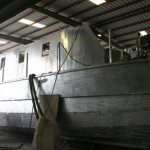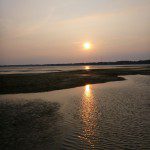Rebecca Wilkerson & Rob Diaz de Villegas WFSU-TV
Fish, lobsters, and scallops, oh my!
 Greater Amberjack Season opens August 1st. For more information including tips, limits and requirements visit the Florida Fish and Wildlife page on recreational amberjack season. (Photo copyright Florida Fish and Wildlife Conservation Commission.
Greater Amberjack Season opens August 1st. For more information including tips, limits and requirements visit the Florida Fish and Wildlife page on recreational amberjack season. (Photo copyright Florida Fish and Wildlife Conservation Commission.
 Although the special two-day Spiny Lobster Sport Season has passed, the recreational Spiny Lobster Season opens on August 6th and will remain open through the end of March 2013. For more information, including restrictions and license requirements, visit the Florida Fish and Wildlife page on spiny lobster. Also, this Florida Fish and Wildlife article has a few great tips on making the most of your lobster chasing. (Photo copyright Florida Fish and Wildlife Conservation Commission)
Although the special two-day Spiny Lobster Sport Season has passed, the recreational Spiny Lobster Season opens on August 6th and will remain open through the end of March 2013. For more information, including restrictions and license requirements, visit the Florida Fish and Wildlife page on spiny lobster. Also, this Florida Fish and Wildlife article has a few great tips on making the most of your lobster chasing. (Photo copyright Florida Fish and Wildlife Conservation Commission)
Anglers, FWC is looking for your opinions. Members will be asked to complete one web-based survey per month for the Florida Saltwater Fishing Panel. The surveys will take 10-15 minutes to complete and will be taken into consideration as a part of management and policy decisions. New members will be accepted throughout the duration of the panel’s operation. To find out more visit the Florida Fish and Wildlife page on the panel.
 The C-Quarters Marina in Carrabelle will host the 9th Annual Kingfish Shootout August 4th and 5th, with a captain’s meeting on the evening of the 3rd. All participants must be registered prior to the tournament. Cash prizes will be awarded at the end of Sunday’s events. Visit the C-Quarters Marina site for more information or to register online. (Photo copyright C-Quarters Marina)
The C-Quarters Marina in Carrabelle will host the 9th Annual Kingfish Shootout August 4th and 5th, with a captain’s meeting on the evening of the 3rd. All participants must be registered prior to the tournament. Cash prizes will be awarded at the end of Sunday’s events. Visit the C-Quarters Marina site for more information or to register online. (Photo copyright C-Quarters Marina)
Bay Scallop Season will remain open until September 25th. For more information on licensing and catch limits, visit the Florida Fish and Wildlife page on scallop season.
 Those of you enjoying scallops out of St. Joe Bay this season, come out and celebrate! The 16th Annual Florida Scallop & Music Festival will take place August 3rd and 4th along St. Joseph Bay. This year’s festival includes live music, a classic car show, the kid zone, and, of course, seafood. Naturally, scallops will be prepared and sold in almost any way desired, and you can take home some frozen scallops. Visit the Florida Scallop & Music Festival site to find out more.
Those of you enjoying scallops out of St. Joe Bay this season, come out and celebrate! The 16th Annual Florida Scallop & Music Festival will take place August 3rd and 4th along St. Joseph Bay. This year’s festival includes live music, a classic car show, the kid zone, and, of course, seafood. Naturally, scallops will be prepared and sold in almost any way desired, and you can take home some frozen scallops. Visit the Florida Scallop & Music Festival site to find out more.
While we’re celebrating bivalves, let’s take a moment to recognize the one that’s nearest and dearest to our hearts on In the Grass, On the Reef. August 5th is National Oyster Day. You might consider this quick and hearty Oyster Stew Supreme recipe as part of your celebration.
FSU Coastal & Marine Lab news
 Construction on a new FSUCML research vessel began in early January 2012. The custom design is tailored for coastal and offshore research in the Gulf of Mexico. The new vessel will have more space and stability than the previous vessel, and will also allow easy adaptation for the specific needs of individual research projects. Visit the FSU Coastal and Marine Lab site to follow the construction progress. (Photo copyright FSU Coastal and Marine Lab)
Construction on a new FSUCML research vessel began in early January 2012. The custom design is tailored for coastal and offshore research in the Gulf of Mexico. The new vessel will have more space and stability than the previous vessel, and will also allow easy adaptation for the specific needs of individual research projects. Visit the FSU Coastal and Marine Lab site to follow the construction progress. (Photo copyright FSU Coastal and Marine Lab)
Corine Samaras is an undergraduate student in the certificate program at the Florida State University. She will be working with Deep-C Consortium on an experiment to study how crude oil from the Deepwater Horizon oil spill decomposes in Gulf of Mexico sediments. You can follow her experiment through her blog on the Deep-C Consortium site.
RESTORE Act
 After two years, a deal has been reached concerning potential fine money that BP will pay for its role in the 2010 oil spill. Under the RESTORE Act, 80% of the money levied will go to the Gulf Coast states-Alabama, Florida, Louisiana, Mississippi and Texas, with up to 21 billion dollars flooding into Florida’s panhandle counties. As this Tallahassee Democrat blog post points out, this money could be a boon to our area. Florida’s money will be distributed by the Governor’s office. The Northwest Florida Daily News reports that officials from panhandle counties are wary of how the state will decide to divide the money.
After two years, a deal has been reached concerning potential fine money that BP will pay for its role in the 2010 oil spill. Under the RESTORE Act, 80% of the money levied will go to the Gulf Coast states-Alabama, Florida, Louisiana, Mississippi and Texas, with up to 21 billion dollars flooding into Florida’s panhandle counties. As this Tallahassee Democrat blog post points out, this money could be a boon to our area. Florida’s money will be distributed by the Governor’s office. The Northwest Florida Daily News reports that officials from panhandle counties are wary of how the state will decide to divide the money.
Florida Regulators Request Standard for Mercury Levels in Fish
Mercury contamination in fish is a global problem. Florida environmental regulators are looking to set standards for the maximum amount of mercury allowed in the state’s fish to make them safer to eat. Studies show that human activity is responsible for two-thirds of the mercury contamination in Florida. Environmental officials are holding public meetings and will continue to to take public input on the issue until August 27th. They will then publish a mercury-level recommendation for approval by the U.S. Environmental Protection Agency. If you missed it, listen to this WFSU-FM story for more information.
In the Grass, On the Reef is funded by a grant from the National Science Foundation
